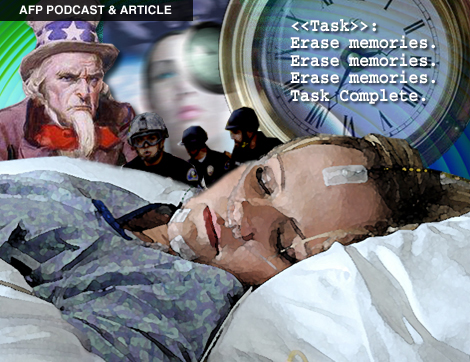
AFP AUDIO INTERVIEW
What if neuroscientists could manipulate our dreams while we sleep by using certain sounds?
Well, guess what, they can.
Dr. Daniel Bendor, a neuroscience researcher at Massachusetts Institute of Technology’s Picower Institute for Learning and Memory’s Wilson Lab details his team’s findings on their scientific trials to control dreams, in this revealing interview (19:01).
Cognitive Manipulation: U.S. Government Funding Research to Engineer Dreams
By Dave Gahary
As Victor Thorn, Corresponding Editor for AMERICAN FREE PRESS reported last month, Americans are entering a brave new world of scientific research, where he showed how humans are increasingly exposed to an exciting, scary new era of medicine, where technology may replace the family doctor, all with an emphasis on the dark side of medical advancements.
Now we can add dream manipulation to Thorn’s peek at the future. And perhaps not surprisingly to some, the United States government is using its National Institutes of Health (NIH) as the lead funding vehicle in this research.
To get a better understanding of this research, AFP conducted an exclusive interview with Dr. Daniel Bendor, a neuroscience researcher at Massachusetts Institute of Technology’s (MIT) Picower* Institute for Learning and Memory’s (PILM) Wilson Lab. PILM is “an independent research entity within MIT’s School of Science focused on a single mission: unraveling the mechanisms that drive the quintessentially human capacity to remember and to learn, as well as related functions like perception, attention and consciousness.”
Along with lab chief Matthew A. Wilson, they reported their findings, entitled Biasing the content of hippocampal replay during sleep in the scientific journal Nature. The study relied on the normal functioning of the hippocampus, a part of the brain that plays important roles in short-term to long-term memory information consolidation, and spatial navigation. The research actually began over three years ago and was published online on September 2.
The researchers achieved, according to an MIT news website, ‘dream engineering’ in rats.
While rats, and humans, sleep, the hippocampus replays certain of the day’s events, almost like watching a movie of what was viewed that day, a process crucial for memory consolidation, known in scientific circles as ‘replay.’ Although this is a well-known fact to the scientific community, what was not known was whether or not the ‘movie’ could be influenced by outside stimuli, which was the crux of the study.
To test their theory, Bendor and Wilson had four rats, with small wires implanted in their brains, ramble through a maze while introducing two different sounds; one sound for food that could be found by going left, the other for food on the right. The rats’ neural activity was monitored and recorded during this, and hours later, while the rats were sleeping. Through a scientific method known as correlative analysis, the researchers were able to determine that the rodents were dreaming of their time in the maze earlier in the day.
During the rats’ dreams, the same sounds from the experiment were introduced and the rats would dream about that section of the maze they were in when they heard that same sound. In effect, their dreams were altered from an external sound.
According to an article in io9, a daily publication that covers science, science fiction, and the future, “the scientists believe that this simple example of dream engineering could open up the possibility of more extensive control of memory processing during sleep — and even the notion that selected memories could be either enhanced, blocked, or modified.”
AFP asked if this sort of research has the potential of being used and possibly abused by the government.
Dr. Bendor stated that the research was done to study memory storage, which may lead to developing therapies in the future for disorders such as amnesia.
“We’re not manipulating these dreams in some arbitrary way,” he said. “It’s only related to what the animal has already experienced.”
He continued. “It’s not like some government project to manipulate everyone’s dreams. It’s more to test how a recent experience gets transferred to long-term memory. If you can manipulate a process, it’s a way of testing how well you understand how it works.”
AFP asked about the funding of the grant for the research, and that the NIH played a big role in the funding.
Dr. Bendor was clear. “The grant is about understanding how brain areas interact with each other to store memory.”
AFP asked if this type of research will be done on human subjects in the future.
“It’s very difficult to study humans,” he said.
The reader should take note, however, that during the U.S.’s short history, it is replete with unethical human experimentation on innocents by the federal government.
*To add another twist to this 1984-type scenario, the lab conducting the research was granted $50 million by a foundation controlled by Jeffry M. Picower, a certified public accountant and lawyer who made the bulk of his fortune by investing with Bernard L. Madoff, the Wall Street con-artist who is serving 150 years behind bars for engineering the largest financial fraud in U.S. history. In 2009, the Picower Foundation was forced to close due to Madoff’s Ponzi scheme, Picower made the Forbes 400 list of richest people in the U.S., and in October of that year, Picower’s wife, Barbara, found him “at the bottom of their swimming pool” at their Florida oceanfront estate. His death was ruled a heart attack by the coroner.
Dave Gahary, a former submariner in the U.S. Navy, is the host of AFP’s ‘Underground Interview’ series.
Be sure to check out all of AFP’s free audio interviews. You’ll find them on the HOME PAGE, in the ARCHIVES & in the AUDIO section.

